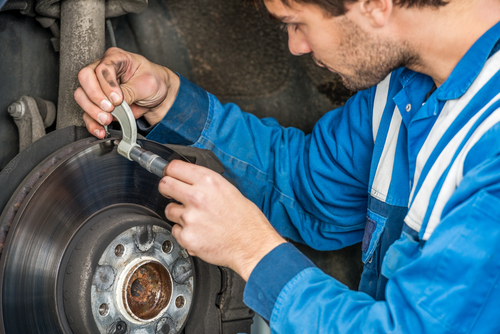Brake problems often seem to come out of nowhere. Nobody wants to realize they need brake repairs or new brake pads in the moment when a child runs into the street to get a ball or when a deer crosses the highway. That’s why you should be proactive and get a brake inspection at the first sign of trouble. Better yet, make it part of your routine auto maintenance with an annual brake inspection.
The lifespan of auto brakes can be hard to predict because the aging process speeds up rapidly at a certain point. It depends on how your driving habits, such as city driving versus highway driving, and other factors. Only a brake inspection can help you feel confident that you can stop when you need to.
Symptoms and Causes of Brake Problems
 Too many people think that brake problems either mean you need new brake pads or all new brakes. A smart auto mechanic can find other solutions. The brake inspection gives you the perfect opportunity to find out what’s wrong and ask your mechanic questions. Then you can understand why the problem started and why the recommended repair is the best way to address the issue.
Too many people think that brake problems either mean you need new brake pads or all new brakes. A smart auto mechanic can find other solutions. The brake inspection gives you the perfect opportunity to find out what’s wrong and ask your mechanic questions. Then you can understand why the problem started and why the recommended repair is the best way to address the issue.
The most common reasons to get a brake inspection and what they mean:
- Noisy brakes: Those screeching and squealing sounds indicate a problem with the brake pads or shoes. The noise comes from the disc brake rotors making contact with other metal parts. Get a brake inspection before the pads have worn so thin that the brakes get major damage elsewhere.
- Hard brakes: Getting a leg workout at every red light? You probably have a problem with the brakes’ hydraulics or the vacuum booster system.
- Brakes slow to respond: If you have brand-new brake pads that feel slow, give them some time to break in. Try driving around an empty parking lot and braking hard to see if that helps. If the pads aren’t new, you need a full brake inspection.
- Braking takes longer to stop: Usually, this is just a warning sign that you’ll need new brake pads soon. But don’t just ask a mechanic to change the pads. If the pads aren’t the problem, you’ll be displeased soon after you drive away. Describe the symptoms and ask for a quick brake inspection to rule out other issues.
- Car shakes when braking: Brakes have so many small parts. Every one needs to be properly installed, tightened, lubricated, and so forth. Vibrations, shaking, and lurching can happen when you’ve been driving around with worn brake pads for too long. Or perhaps the rotors, calipers, lug nuts, or other parts were over-tightened or under-tightened.
Less common brake problems include the car pulling to one side when you brake or bad smells coming from the car or tires. Whatever issues you’ve noticed, a brake inspection can reveal the easiest way to fix your brakes before you wind up with a more expensive or dangerous situation.
Brake Inspections Near Santa Rosa, CA
If your brakes feel spongy or hard to press down, or an annoying brake squeal has started, don’t put off getting your car serviced. Contact All Around Auto Repair to schedule a brake inspection in Windsor, CA by a trusted local repair shop!

